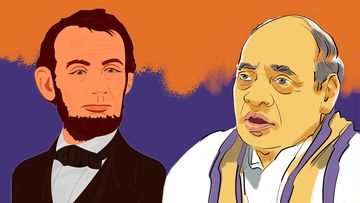Abraham Lincoln is lauded as among the very best presidents the US ever had: the statesman par excellence successfully steered the nation through the devastating and perilous years of the American civil war. Not only did Lincoln manage to keep his country united, he also ensured the passage of the 13th amendment to the US constitution, which abolished slavery.
All through these arduous years, Lincoln had by his side in his cabinet three men who had been political adversaries, and had contested against him for the 1860 Republican presidential nomination. Even beyond that, at a time of great national division and acrimony, Lincoln included three Democrats in his cabinet. Most of these men were more educated, and had enjoyed far more political prestige, than Lincoln himself. Yet, he did not hesitate to give them political importance that a lesser man might have feared would diminish him.
Lincoln built around himself what the American historian Doris Kearns Goodwin calls “A Team of Rivals”. He knew that at such a time of great national calamity, he needed all the best hands on deck. So, keeping personal and political egos and rivalries aside, he entrusted his former rivals with governing the US alongside him at its darkest hour. The rest, as they say, is history. Not only did Lincoln manage to keep the union intact and abolish slavery, he also rose—by dint, as Goodwin writes, “of a profound self-confidence”—to “a most unexpected greatness”, giving the world in the process a masterclass in exemplary leadership.
When I first became chairman of the parliamentary standing committee on external affairs, I said that “there is no such thing as a Congress foreign policy or a BJP foreign policy; there is only Indian foreign policy, and Indian national interests”. That sentiment did not prevent the BJP from removing me after one term as chairman.
But, five years later, as I serve again as chair, I cannot help but reflect on the bipartisanship and inter-party consensus that is characteristic of Indian foreign policy. Throughout the history of the committee—until I was replaced for five years by a BJP MP—the committee on external affairs was headed by an opposition MP, if only to demonstrate that our political differences stopped at our borders.
This bipartisanship was again revealed in a famous episode of Indian diplomatic history in 1994, when prime minister Narasimha Rao picked opposition Leader (and then chairman of the external affairs committee) Atal Bihari Vajpayee to lead the Indian delegation to present India’s case on Kashmir and counter Pakistan’s falsehoods, at a United Nations session in Geneva. The Congress’s minister of state for external Affairs, Salman Khurshid, was named as Vajpayee’s deputy! Later, as prime minister, in one of his historic parliamentary speeches, Atal ji amusingly recalled just how bewildered the Pakistani governing class was at seeing an opposition leader representing his nation’s interests at such a prestigious forum, and at such a crucial moment; because in Pakistan, he quipped, they were probably more used to opposition leaders creating trouble for their nation rather than helping their government! But such, Atal ji concluded, is our “vichitra loktantra” (strange democracy)—as clamorous and chaotic as it is miraculous and mesmerising.
Sadly, this episode has not been repeated in the last three decades, as our politics has turned ever more rancorous and bitter. There is very little mutual respect and friendship on display between the ruling party and the opposition. The core assumption of democratic politics is supposed to be that both sides understand that the other is as committed to the national interest as itself, even if they disagree on how best to ensure the nation’s well-being. In that sense the two sides are not enemies but adversaries. Sadly, there has been no indication on the government’s part in the last decade that it appreciates the legitimacy of the other side, whose statements and actions it frequently dubs as “anti-national”. Delegitimising opposition is to diminish our democracy.
With a far stronger opposition in Parliament, one hopes that attitude will change, to strengthen the very vichitra loktantra that Vajpayee spoke about. Only if MPs of all parties serve together and cooperate and collaborate constructively and creatively will India—and not just the government—succeed.
editor@theweek.in


